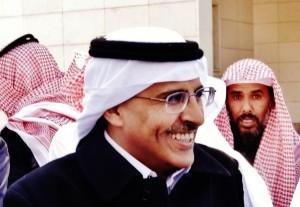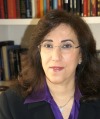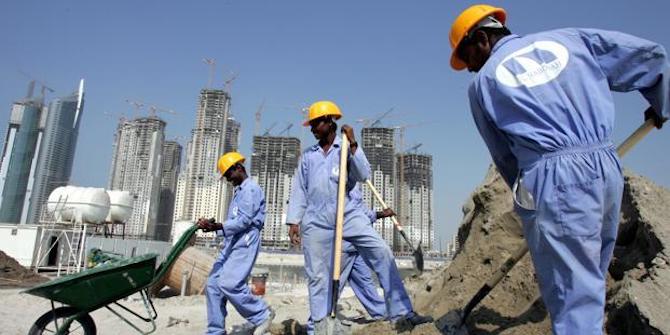Last Wednesday, Professor Madawi Al-Rasheed presented her on-going research that she is undertaking as part of her visiting appointment at the MEC. With the research still underway, the meeting was more of a discussion session between fellows and faculty at the centre, which created a very lively and interesting debate on Islamic thought in Saudi Arabia and the wider Middle East today.
Professor Al-Rasheed’s research tries to move away from the traditional segmentation of Islamist/secular when studying the Arab and Muslim worlds. It looks at the emergence of a new type of young thinkers/intellectuals (Al Moufakker al Islami) whose work has increased since the Arab Uprisings. These young thinkers have distanced themselves from the traditional Islamists as well as Salafis. They are producing and publishing through different channels, be it traditional print or online social media (Twitter, Facebook…). They represent a new group of people who are disenchanted by the traditional Islamic thinkers (Ulama) and who are building links with other groups that have been previously distanced from politics (for example: activists who ask to lift the ban on women’s driving, more mixing of sexes, etc.). ‘Al Moufakker al Islami’ cannot be easily classified as ‘Islamo-liberal’, he/she is rather a mutation, a hybrid.
Blurring the boundaries between what is divine politics and secular politics

The core demand of activists in Saudi Arabia is the formation of a civil society (Moujtama’ Madani). One important activist group that the research focuses on is the Association for Civil and Political Rights (HASEM). After 9/11 the Saudi government established two human rights organisations, whose members were appointed by the government itself, arguably defeating their purpose. HASEM, on the other hand, was established in 2009 with no royal patronage. Its founding members were an interesting mix of Islamists, activists and academics, working together to bridge the divide between these groups.
HASEM members are on the forefront of demanding a constitutional monarchy, which is considerably difficult to justify from an Islamist point of view. However, HASEM were able to devise ways of reinterpreting Islamic thought to find a middle ground, by not calling for the overthrow of the regime but instead for change from within.
One of HASEM’s important contributions was the production and distribution of their pamphlets encouraging peaceful Jihad (Al Jihad al silmi). While this was rejected by Salafis because it undermined the authority of the ruler and increased the possibility of chaos, HASEM was able to theorise the need for this pamphlet by linking it to the past and to the need for a civil society in Saudi Arabia. For them, civil society is not Western, but a marrying of Islamist thought with international human rights – a platform many identify with. By being hybrid, HASEM was able to reassure Salafis that they are not simply implementing a Western scheme, while also confirming to those who fear the Salafi agenda that they are committed to Human Rights.
After initially ignoring HASEM, the government only started considering them a threat after the Arab Uprisings, at a time when there was increased activism and more engagement with activists in other Arab countries, especially online. By 2013, all the founding members of HASEM were jailed, and having links with the organisation became illegal.
One would say that a civil society organisation that was thwarted at such a young age is a complete failure. However, HASEM has left an important legacy for Saudi civil society. For the first time, Saudis are aware of what’s happening in the court, thanks to social media. The court hearings of HASEM members became a theatrical performance where human rights were enacted in the speeches of the accused and the prosecutors. The court is now subversive; with this documentation continuing to inspire many activists.
HASEM might have had a short-lived history, but its hybridity, its ability to bridge the Salafi-secular divide and its performance in the court where legal and human rights became the language of operation, all are proof of its long-lasting influence on Saudi activists of the future.
 Madawi Al-Rasheed is Visiting Professor at the Middle East Centre at LSE and Research Fellow at the Open Society Foundation. She was Professor of Anthropology of Religion at King’s College, London between 1994 and 2013. Previously, she was Prize Research Fellow at Nuffield College, Oxford. She also taught at Goldsmith College (University of London) and the Institute of Social and Cultural Anthropology, University of Oxford. She tweets at @MadawiDR.
Madawi Al-Rasheed is Visiting Professor at the Middle East Centre at LSE and Research Fellow at the Open Society Foundation. She was Professor of Anthropology of Religion at King’s College, London between 1994 and 2013. Previously, she was Prize Research Fellow at Nuffield College, Oxford. She also taught at Goldsmith College (University of London) and the Institute of Social and Cultural Anthropology, University of Oxford. She tweets at @MadawiDR.






